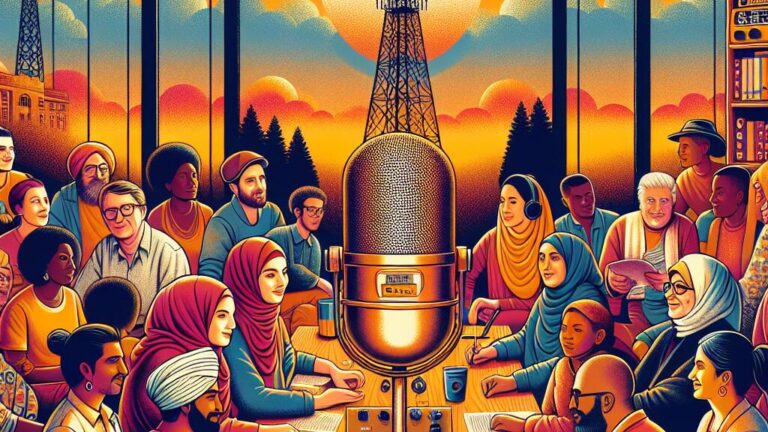What is the Role of Community Radio in Social Movements
Table Of Contents
Key Takeaways
- Comprehending Community Radio and its significance in giving voice to local communities.
- Importance of Community Radio in promoting social change and supporting grassroots movements.
- Community Radio’s impact on social movements illustrated through real-life examples.
- Analysis of case studies showcasing the effectiveness of Community Radio in driving social change.
Understanding Community Radio
Community radio plays a crucial role in social movements by providing a platform for marginalized voices to be heard, fostering community engagement, and promoting social change. With its unique ability to tailor programming to the specific needs and interests of local communities, community radio stations serve as vital outlets for grassroots organizing, awareness building, and advocacy efforts. These stations act as catalysts for social transformation, empowering individuals to address issues such as social justice, environmental sustainability, and human rights. By collaborating with community members, organizations, and movements, community radio stations amplify diverse perspectives and facilitate dialogue that drives positive change within societies.
Definition and Function of Community Radio
Community radio is a form of media that is run by the local community it serves. It is an essential entity that plays a significant role in fostering community resilience and promoting plurality. With its availability and unique characteristics, community radio often serves as a platform for various social movements. What is the Role of Community Radio in Social Movements? Community radio stations drive social change by offering a voice to individuals and groups who might not have a platform in mainstream media. Through its programming and networking capabilities, community radio stations can become instrumental in fueling influential social movements that aim to bring about positive change in society.
Roots of Community Radio: A Historical Perspective
Community radio has a rich historical background that dates back to grassroots movements and social uprisings. The roots of community radio lie in its origins as a tool for empowerment and resistance against mainstream media’s marginalization of certain voices. Originating from community-led initiatives, community radio stations have served as platforms for mobilizing citizens, amplifying local issues, and fostering dialogue within marginalized communities across the globe. Community radio’s historical evolution showcases its pivotal role in empowering individuals, promoting social justice, and challenging dominant narratives through inclusive and participatory programming.
The historical perspective of community radio underscores its significance in shaping social movements by providing a platform for unheard voices and marginalized communities. What began as a response to the silencing of diverse perspectives in traditional media has evolved into a powerful tool for advocacy, activism, and community development. By highlighting local concerns, promoting cultural diversity, and fostering civic engagement, community radio has become a driving force behind social change and grassroots mobilization. Its historical trajectory reflects a commitment to serving the interests of communities, promoting social cohesion, and advocating for inclusive media spaces that empower individuals and transform societies.
Relevance of Community Radio
Community radio plays a crucial role in social movements by providing a platform for marginalized voices, fostering community-building, and promoting social change. Through its unique characteristics such as community involvement, advocacy for free speech, and folk media storytelling, community radio acts as a vehicle for citizens to participate in daily news stories, discussions, and advocacy bodies. This involvement extends to promoting awareness and influencing important issues like land tenure systems, climate policy, and sustainability. Community radio’s ability to highlight local culture, education, and employment opportunities, along with its role in supporting community ventures and social policy initiatives, underscores its relevance in today’s digital era.
Unique Characteristics of Community Radio
Community radio, with its varied programming and local focus, plays a pivotal role in amplifying the voices of marginalized communities. The diverse content provided by community radio stations caters to the specific needs and interests of listeners, fostering a sense of inclusivity and empowerment. What is the Role of Community Radio in Social Movements can’t be overstated; community radio stations serve as platforms for dialogue, information-sharing, and mobilization, enabling communities to address social issues collectively and drive positive change in their societies. This localized approach, coupled with the flexibility to adapt to changing community needs, sets community radio apart as a vital tool for social cohesion and advocacy.
- Encourages community participation and engagement in programming
- Provides a platform for underrepresented voices and perspectives
- Fosters a sense of belonging and connection within the community
- Promotes cultural preservation and celebrates local heritage
- Facilitates discussions on important social issues and promotes civic dialogue
Why Community Radio Matters in Today’s Digital Era
Community radio plays a crucial role in social movements by providing a platform for marginalized voices to be heard and issues to be addressed. It serves as a tool for empowerment, allowing communities to share stories, advocate for change, and mobilize for collective action. By broadcasting locally relevant content and fostering community engagement, community radio stations become catalysts for social justice and positive transformation in their respective areas. Through their inclusive programming, training materials, and streaming services, these radio stations contribute significantly to the empowerment and mobilization of communities, especially in regions like the Kumaon region and mining districts where mainstream media may not reach effectively.
Community radio stations represent a paradigm shift in the media landscape, offering an alternative to traditional outlets and amplifying voices that are often marginalized or ignored. By promoting communication rights and providing a platform for diverse perspectives, they challenge the media margins and contribute to a more inclusive and participatory media environment. In addition to influencing social movements and impactful social campaigns, community radio stations act as vital resources for education, information dissemination, and community building. Their unique position as grassroots communicators allows them to bridge gaps, build bridges, and create spaces for dialogue, unity, and positive social change.
Community Radio’s Involvement With Social Movements
Community radio plays a crucial role in social movements by providing a platform for marginalized voices to be heard and empowering local communities to organize and advocate for their interests. Through community radio stations, individuals can access information, share their stories, and mobilize for social change. These stations serve as a vital tool for fostering community cohesion and amplifying grassroots movements. By offering an alternative to mainstream media outlets, community radio facilitates the spread of diverse perspectives and encourages active participation in societal issues.
Community Radio as an Instrument of Social Change
Community radio plays a crucial role as an instrument of social change by amplifying the voices of marginalized groups and providing a platform for community members to express their concerns, aspirations, and mobilize for collective action. This platform enables direct engagement with local issues and fosters a sense of belonging and empowerment among listeners. Through its localized focus, community radio stations mount everest to challenge mainstream media narratives and provide alternative perspectives that resonate with the community’s interests and values.
Incorporation of community radio stations into social movements is essential as they serve as a counterbalance to traditional media organizations by offering grassroots perspectives and promoting transparency and accountability. These stations often operate without the burden of licence fee constraints that commercial or state-run media face, allowing them to focus on community-driven content that addresses the specific needs and interests of their audiences. Community radio stations like rádio comunitária – veja the responsibility to ensure that information disseminated is accurate and relevant, countering misinformation and empowering communities to make informed decisions.
Influential Social Movements Fueled by Community Radio
In social movements, community radio serves as a powerful tool for advocacy and mobilization. What is the Role of Community Radio in Social Movements? Community radio stations, often run by volunteers and local community members, play a vital role in amplifying the voices of marginalized groups and fostering dialogue on important social issues. These stations provide a platform for grassroots organizations and civil society groups to share their perspectives, shape public discourse, and mobilize support for various causes. From Ma’an in Jordan to Borendra Unnayan Prochasta in Bangladesh, community radio stations around the world have demonstrated their capacity to fuel social movements and drive positive change in their respective communities.
| Community Radio Station | Location | Key Contributions to Social Movements |
|---|---|---|
| Ma’an Community Radio | Jordan | Amplifying voices of marginalized groups, fostering dialogue on social issues |
| Borendra Unnayan Prochasta | Bangladesh | Providing a platform for grassroots organizations, mobilizing support for causes |
| Radio Zapatista | Mexico | Empowering indigenous communities, advocating for social justice |
| Radio Dabanga | Sudan | Raising awareness on human rights issues, promoting peace and reconciliation |
Examining Case Studies
In examining case studies of community radio’s involvement with social movements, it becomes evident that community radio plays a crucial role in empowering marginalized voices and fostering social change. Through its unique characteristics and localized content, community radio stations have been instrumental in amplifying grassroots movements and promoting civic engagement. The interactive nature of community radio allows for direct participation from community volunteers and listeners, creating a sense of ownership and empowerment within local populations. Looking at successful social campaigns led by community radio stations in various regions like London, Guatemala, and Nepal, it is clear that community radio continues to be a powerful tool for social mobilization and advocacy. Whether through broadcasting community programming, sharing important information, or providing a platform for dialogue, community radio remains a vital component in advancing social justice initiatives worldwide.
Community Radio Contributions to Successful Social Campaigns
Community radio plays a pivotal role in social movements, acting as a powerful platform for marginalized voices to be heard. Through its localized nature and community-driven content, community radio stations have the ability to disseminate information, mobilize people, and drive social change. In instances like the Garhwa block in India, community radio stations like Radio Namaskar have collaborated with grassroots defenders like Sreedher Ramamurthy to amplify local issues and spark significant debate within the precincts of the community. These stations provide an alternative voice to mainstream media, challenging traditional narratives and empowering communities to take action against injustices, even with limited resources and advertising budgets.
In regions like the Sierra Norte de Puebla in Mexico, community radio stations like Radio Cuetlaxcoapan have proven instrumental in challenging gender norms and promoting gender equality through their programming. By providing a platform for dialogue and discussion on gender-related issues, these stations actively contribute to changing societal perceptions and promoting inclusive practices. The involvement of these stations in addressing critical issues such as gender equality highlights the crucial role community radio plays in fostering dialogue, raising awareness, and shaping the socio-cultural landscape in a more equitable manner.
Analysis: Impact and Limitations of Community Radio in Social Movements
Community radio plays a pivotal role in social movements by providing a platform for marginalized voices to be heard and for community issues to be addressed. It serves as a powerful tool for social change, fostering active participation and engagement among citizens. The connection established through community radio nurtures a sense of belonging and empowers individuals to collectively address societal challenges. Furthermore, community radio stations syndicate content, broadcasting a slew of diverse perspectives and facilitating dialogue that strengthens community ties.
In examining the impact and limitations of community radio in social movements, it is evident that these stations have made significant contributions to successful campaigns and protests. By amplifying the voices of grassroots movements and providing emergency coverage during critical circumstances, community radio stations have emerged as a vital source of information and morale for citizens. However, challenges such as limited resources, licensing restrictions, and spectrum management issues can hinder the full potential of community radio in driving social change. Despite these obstacles, community radio stations continue to foster change, bolstering social movements and advocating for progressive causes.
Conclusion
Analyzing the pivotal role of community radio in social movements sheds light on its unparalleled significance in amplifying voices, fostering community engagement, and advocating for social change. Community radio stations act as catalysts for driving grassroots initiatives, empowering marginalized groups, and facilitating dialogue among stakeholders. Through its localized approach and participatory ethos, community radio plays a crucial role in advancing social justice, amplifying diverse perspectives, and promoting inclusive narratives. The unique ability of community radio to prioritize community needs, provide a platform for underrepresented voices, and foster community solidarity is instrumental in driving social movements forward. Its role in social movements is not just about broadcasting information; it’s about empowering communities, sparking discussions, and mobilizing collective action towards positive social change.
FAQS
What is community radio?
Community radio refers to radio stations that are operated by members of a specific community, typically on a non-profit or voluntary basis to serve the interests and needs of that community.
How does community radio differ from commercial or public radio?
Community radio differs from commercial or public radio in that it is owned and operated by the community it serves, allowing for more localized and diverse programming that reflects the unique needs and interests of the community.
What role does community radio play in social movements?
Community radio plays a crucial role in social movements by providing a platform for marginalized voices, fostering community engagement and activism, raising awareness on social issues, and mobilizing support for various causes.
Can community radio contribute to social change?
Yes, community radio can contribute to social change by empowering communities, challenging mainstream narratives, promoting social justice, and fostering dialogue and collaboration among different groups within a community.
How has digitalization impacted the role of community radio in social movements?
Digitalization has expanded the reach and impact of community radio by enabling online streaming, social media engagement, and content sharing, allowing for broader participation, interaction, and influence in social movements.







